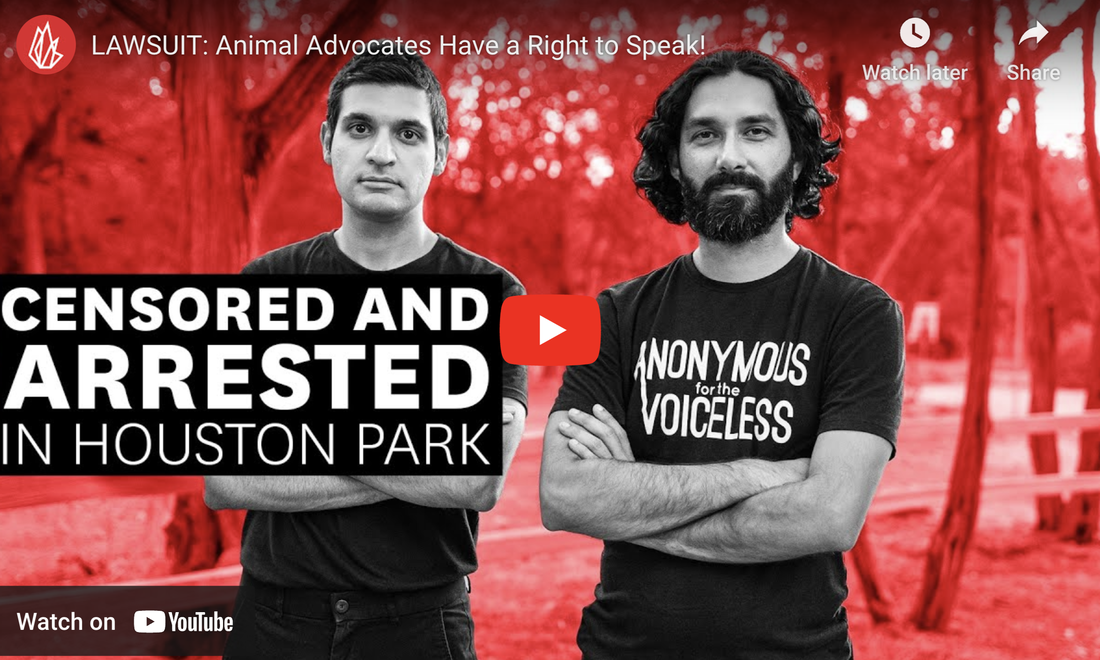|
Protest can be uncomfortable. It’s often meant to be. From the very outset of our American experiment, protest was a means of shaking up the status quo and communicating hard truths – dating back to the 1688 Germantown Quaker petition against slavery and continuing today through the Black Lives Matter movement.
This tradition is fully protected under the First Amendment, though sometimes local authorities can lose their way under pressure and cave to censorial instincts. Take the case of Dr. Faraz Harsini and Daraius Dubash, two animal welfare advocates prevented by local authorities from exercising their right to free speech in Houston’s downtown Discovery Green Park. Both immigrants to the United States, Harsini and Dubash are members of Anonymous for the Voiceless, a grassroots advocacy group dedicated to combating animal cruelty. Dr. Harsini, a cancer and infectious disease expert, fled Iran after nearly being killed for protesting against the government. Dubash comes from India, where people enjoy substantially fewer free speech protections than in the United States. But it wasn’t until Dubash came to the United States that he was arrested for peaceful advocacy. Here’s the backstory: In the summer of 2022, Harsini and Dubash held an educational series in Discovery Park. This park has a long history of protest, without incident hosting pro-choice protests, anti-NRA protests, LGBTQ demonstrations and more. In the eyes of authorities, however, Harsini and Dubash went too far when they held a “Cube of Truth” – a bodily held television screen playing excerpts from the film Dominion, which documents factory farming practices. Looking at the screen – small enough for a protestor to hang on a harness – could be easily avoided by passersby. The two men were respectful, only speaking to passersby who engaged with them first. Yet nearly every time Harsini and Dubash visited the park, police asked them to leave at the request of park management (Discovery Green Conservancy), which found the documentary’s content “offensive.” Each time they complied – until Dubash finally explained his First Amendment right to be there to the police. Police arrested Dubash for his troubles and charged him with criminal trespass. The district attorney subsequently dismissed the charges. Now, the Law & Religion Clinic at the University of Texas and the Foundation for Individual Rights and Expression (FIRE) are bringing suit against the City of Houston, the Discovery Green Conservancy and two individual police officers for First and Fourth Amendment violations. As the U.S. Supreme Court recognizes, public parks – like public sidewalks – have long been places for “assembly, communicating thoughts between citizens, and discussing public questions.” In their communications with Harsini and Dubash, police argued that Discovery Green is a private park – an assertion that is false on its face. The City of Houston acquired the land and principally funded the park’s creation. Its “Covenants as to Use” state that “[s]uch property shall be used solely as an urban public park of high quality, reputation and natural beauty.” The fact that the city contracts with the private Discovery Green Conservancy for management does not absolve them from violating the First Amendment. Authorities’ assertion that the documentary’s content is “offensive” is unlikely to get them off the hook, either. Protest speech can be offensive, it just can’t be obscene. In 1972, the Supreme Court laid out a tripartite test for determining whether speech falls into that unprotected category. Courts now evaluate: 1) whether “the average person, applying contemporary community standards” would find that the message appeals to “prurient interest,” (2) whether the work depicts or describes, in a patently offensive way, sexual conduct specifically defined by the applicable state law, and (3) whether the work, “taken as a whole,” lacks serious literary, artistic, political, or scientific value. In the case of Harsini and Dubash, the images they depicted are of standard, lawful industrial meat production practices. Those images may be upsetting. That’s the point, and one can hardly argue they lack serious political value in the context of an ongoing national debate about farm animal welfare. As such, Houston authorities cannot justify this content-based censorship. Houston might do well to follow the lead of the D.C. Circuit Court, which has repeatedly upheld the rights of citizens to speak freely on the U.S. Capitol grounds, rejecting arguments that they are a “special type of enclave” immune from the guarantees of the First Amendment. In cases like Jeannette Rankin Brigade v. Chief of Capitol Police and Lederman v. United States, that court has repeatedly shot down, on the basis of their very public character, the idea that those grounds constitute a nonpublic forum. Similarly, a well-designated public park that has traditionally held demonstrations cannot suddenly be deemed private based on an official’s subjective interpretation of what is offensive. Constitutional law will make that determination and will, more than likely, vindicate Harsini and Dubash in the process – and their right to display their Cube of Truth. Comments are closed.
|
Archives
June 2024
Categories
All
|
ABOUT |
ISSUES |
TAKE ACTION |



 RSS Feed
RSS Feed